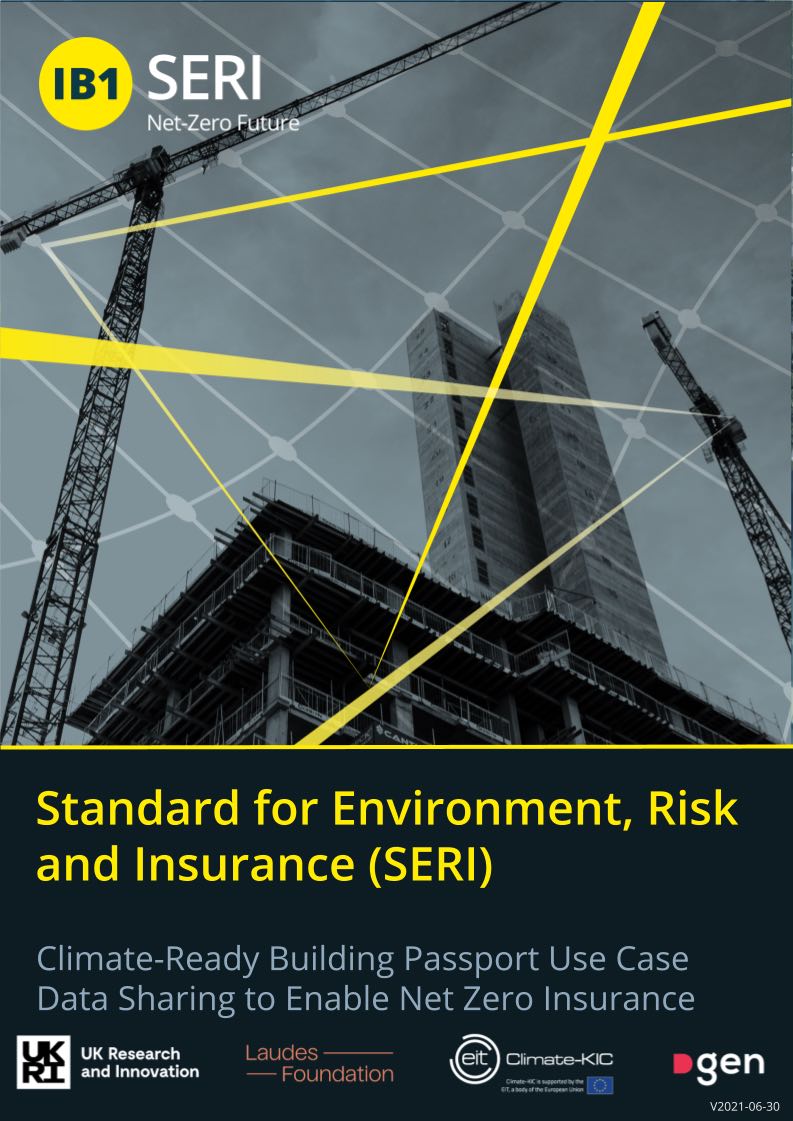
This document is open for comment, click here for the report.
Executive Summary
The built environment contributes around 40% to greenhouse gas (GHG) emissions in the UK. As over 80% of the buildings in use today will still be in use by 2050, retrofitting the UK’s existing building stock is critical for achieving the UK’s 2050 net zero targets. In the transition to net zero, the insurance industry can play a critical role in helping stakeholders manage and transfer risks, including the built environment sector. Data sharing is one of the biggest barriers to the transition. The Standard for Environment, Risk and Insurance (SERI) project is looking to tackle this issue through creating a secured shared data governance framework with our industrial partners and advisory groups. To enable the development of the framework, we have developed a Climate-Ready Building Passport (C-RBP) concept to demonstrate the commercial value the framework can create and how it assists the insurance industry incentives net zero behaviours.
The C-RBP concept, developed by the SERI project, is a design for a data service enabled by the decentralised and secured SERI shared data governance framework (cf. A Pathway Towards SERI: Operational and Technical Considerations Report). It aims at providing a means to capture and share data on a building’s life cycle (including both climate change resilience and mitigation data) and enable stakeholders with the data they need on their pathway to GHG reduction goals. The C-RBP insurance market use case utilised the special position of insurance brokers in the insurance value chain to bring key stakeholders, i.e. asset managers and insurers, into the story. It analyses data needs, data sharing and data flow amongst them in a commercial building insurance case to demonstrate the value of C-RBP for the insurance industry and beyond in the net zero transition.
During our work on the use case development, we have identified a few gaps, challenges and opportunities to innovate net-zero insurance products. The main findings were:
- Although the underlying principles of data sharing and data governance of SERI are similar to Open Banking and Open Energy, the complexity of the insurance ecosystem, its resistance to data sharing and slow reactions to the net zero transition make it more challenging to bring insurance commercial value and net zero goals of the economy together. For this reason, more contributions from asset managers, insurers are essential to further develop the Phase I SERI use case.
- Current insurance data capture focuses on climate resilience rather than climate change mitigation. To enable net zero insurance, there is a data gap for the industry to understand how to bring emissions into consideration of their underwriting process. Our research identified a number of valuable data that could contribute to better risk analysis and net zero underwriting. This data includes BIM, earth observation, IoT and other smart data, BRP, EPC, DEC, EPD, ESG, GRESB and other risk assessment tools data.
- Insurance premium reductions alone are not enough to incentivise the high cost building retrofitting. Government subsidies, green financing, insurance rebates and retrofitting roadmaps can pair up with net zero building insurance to strengthen the incentives.
- As the insurance industry is still at the starting point of the net zero transition, government policies and regulations to enforce sustainability measures such as TCFD/ESG reporting and compulsory building energy performance ratings are required to ensure the insurance industry plays its key role in net-zero transition as it declared. Current short term insurance risk transfer measures are not capable of covering large scale risks caused by long term climate change. Systemic risks of climate change needs be taken into consideration of policy making to enforce the industry to take the route of net zero underwriting (cf. Envisioning SERI’s Regulatory and Data Sharing Framework Report). Legal work on insurance net-zero clauses are also useful.
- A few potential innovative insurance products are identified through the C-RBP insurance market use case. They are “retrofitting led building insurance”, “climate-ready building insurance” and “retrofitting roadmap-based renewal”.
- The SERI shared data governance framework can bring values to stakeholders in the building insurance value chain through the C-RBP application by enabling data visibility, open standards and secured data sharing (cf. The Potential Transformation of the Insurance Market Report).

